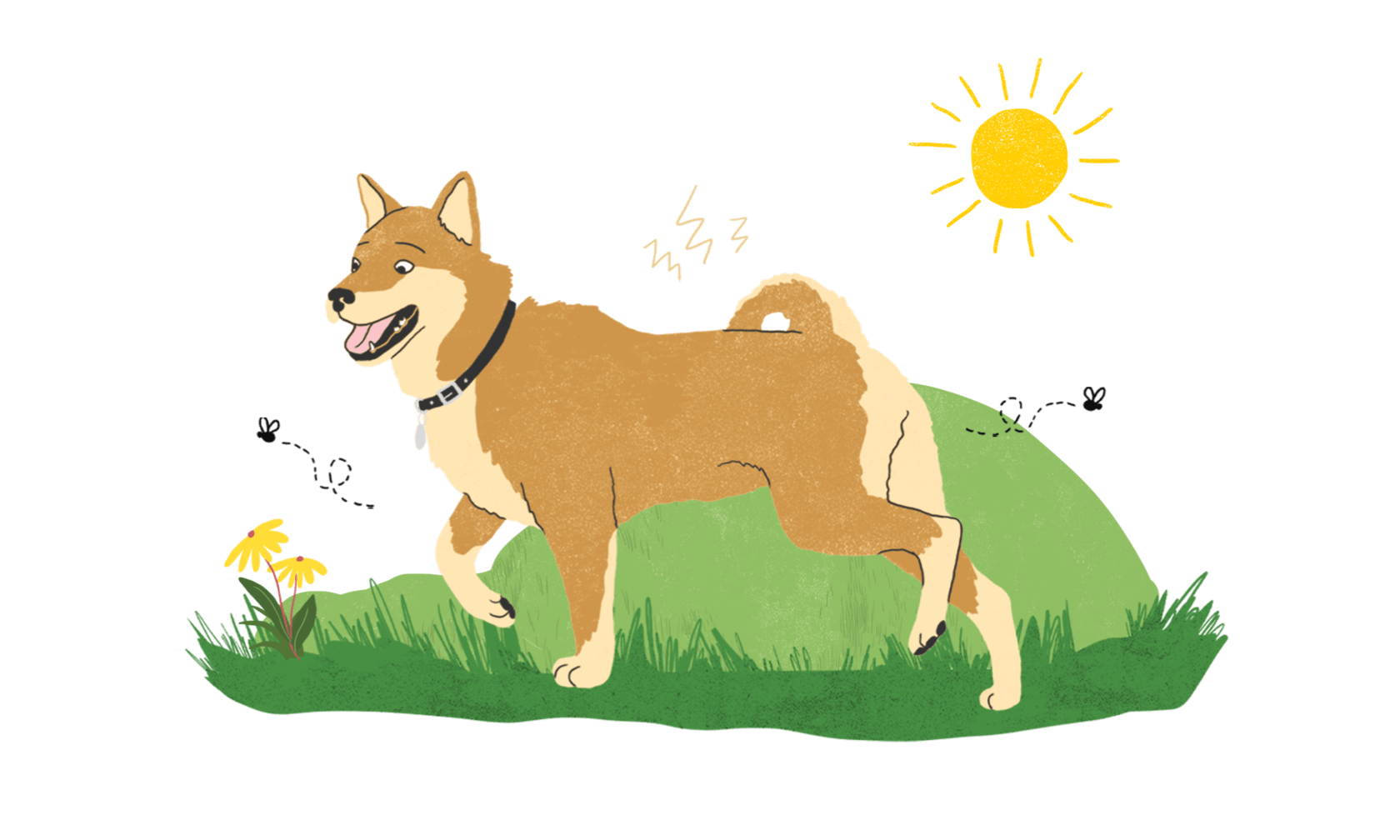You know the scenario — that endless scratching that keeps you both up at night. Maybe you tried a few itch remedies, saw some improvement, and thought the problem was solved. You stopped the medication only to have that pesky itch come roaring back. Eventually you took your dog to the veterinarian because they continued to show signs of being itchy (scratching, paw licking, scooting, chewing or biting at their skin) and the vet may have treated your dog for skin infections, ear infections, or even a hot spot or two in the past.
Now you visit your vet and they've let you know those symptoms were caused by your dog having skin allergies (allergic dermatitis), which can be caused by seasonal allergies, food allergies, flea allergies, and contact allergies. Read on to learn more about dogs whose seasonal allergies become year-round and the allergic itch these dogs deal with on a regular basis.
Why Long-Term Treatment Is Often Needed for Allergic Itching
When your dog feels less itchy you may wonder, “Does my dog still need their treatment plan?”
Some dogs have specific allergy triggers, like certain proteins in food or seasonal pollen. But, if your dog’s seasonal allergies progress and become a chronic issue, your dog may require ongoing management to minimize flares of itchiness. These dogs often have a genetic predisposition to inflammation and itch, which means their discomfort is not likely to go away on its own. Just because your dog stops scratching once they're on treatment doesn't mean they're "cured." Think of it like wearing contact lenses — your vision is improved, but you're right back where you started when you take them out. It can be the same for allergic itch control. If you stop treatment, it’s likely the itching will return. As such, it’s critical that you continuously follow through on the entire treatment plan from your veterinarian.
Missing a dose or stopping treatment early can lead to a return of the allergic itch. That’s why it’s important to make sure you are following your veterinarian’s treatment recommendations every day.
When To See a Veterinarian Again
Your vet will get you started on the treatment plan for your dog, but there are many reasons to bring your dog back in to discuss their itch again.
Your vet requested a recheck at your last visit
They may want to confirm the therapies are working and discuss the benefits of doing a diet trial or testing to see whether food or environmental allergens make your dog itchy.
Your treatment plan has run its course (for example, your prescription has run out of refills)
If your dog has chronic allergic disease, their itch is bound to return sooner rather than later. Visit with your veterinarian to discuss renewing your dog’s treatment plan to help minimize future itch flares.
Your dog still seems itchy
Not every plan works for every dog with skin allergies! The goal is to reduce the severity of itch and number of itch flares your dog has over the rest of their life. It can take some trial and error to find the right combination of therapies to relieve your dog’s itchiness. While topical therapy can be a great place to start, your veterinarian can reach for prescription options that work in different ways to control itching.
The Risks of Inconsistent Treatment for Your Dog’s Allergic Itching
Dogs that don’t receive appropriate treatment for their skin allergies can develop a host of secondary issues that are not only uncomfortable and painful but can cost you more money and time at the veterinary clinic.
Here are some of the issues that can arise in dogs that are not properly treated for their skin allergies.
Skin Infections
An itchy dog is going to scratch and lick … a lot. This damages the skin and allows bacteria and yeast that are normally on the skin to overgrow, resulting in skin infections, hot spots, and open wounds.
Ear Infections
If your dog’s allergies cause ear infections, it’s vital to keep those allergies under control because ear infections are painful. The more ear infections happen, the more difficult it can be to treat them.
When a dog’s ears keep getting inflamed and infected, the skin can get leathery, and the ear canal opening might narrow. This makes it tough for vets to check inside the ear and to apply topical ear medications properly.
Eventually, the ear can become so damaged and painful that your vet might suggest surgery to permanently remove the canal, just to make your dog more comfortable.
Skin Changes Due to Repeated Damage and Trauma
Repeatedly scratching, licking, or chewing the same area of their body can lead to cuts and sores. This perpetuates a nasty cycle because skin infections are likely to develop due to their damaged skin, which will make your dog feel itchier and want to scratch more.
The Benefits of Consistent Allergic Itch Treatment
Consistent treatment isn’t just about temporary relief — it’s about keeping your dog comfortable and healthy for their entire life.
If your veterinarian recommended (and you’re already giving your dog) an anti-itch medication, consistency is key to ensure:
- Better daily management of itching and discomfort
- Faster recovery from flare ups
- An improved quality of life for both your dog and your family, including sleeping better, reduced stress, and more energy to play and do your normal activities together.
Skin allergies were the #1 reason for vet visits and the most common health issue for dogs for the 12th year in a row.1 Keeping up with the maintenance therapy for your dog could benefit you and help you save money in the long run. Consistent allergy treatment for your dog can help minimize the need for extra vet visits and medications to address secondary issues associated with their skin condition.
Tips for Itchy Dog Treatment Success
Keeping up with any treatment can be tricky when life gets busy. Here are a few simple tricks to help you stay on track with managing your dog’s allergic itch.
Find the Right Formulation
Getting a dog to take a pill or liquid medication can be challenging and stressful for everyone. Talk to your vet and they can recommend a medication with an easier-to-give formulation that your dog will accept. There’s no need to hide medications in treats or wrestle with your dog to take their medication.
Stick to a Schedule
Giving medication at the same time each day makes it part of you and your dog’s routine.
Keeping your veterinarian updated on how your dog is responding to all their medications is crucial. Noting any changes in your dog’s behavior — if their sleep has improved, if they’re scratching less, if their weight changes, etc. — will help your vet adjust the treatment as needed. No one ever wants their dog to have another flare-up, but the reality is that this chronic condition can progress over time. Since we can't make an allergic dog's allergies disappear, the goal of treatment is to relieve the itch now and reduce the number of flare-ups in the future. A comfy dog with fewer itch flares means better sleep for everyone, more fun together, and fewer skin issues down the road.
Remember, consistently giving your dog their allergy medications isn’t just about stopping the itch. It’s about keeping them on the best treatment plan for their skin allergies and giving them the happy, comfortable life they deserve.
APQ-01629
IMPORTANT SAFETY INFORMATION: See full Apoquel Tablet and Apoquel Chewable Prescribing Information. Do not use Apoquel or Apoquel Chewable in dogs less than 12 months of age or those with serious infections. Apoquel and Apoquel Chewable may increase the chances of developing serious infections, and may cause existing parasitic skin infestations or pre- existing cancers to get worse. Consider the risks and benefits of treatment in dogs with a history of recurrence of these conditions. New neoplastic conditions (benign and malignant) were observed in clinical studies and post- approval. Apoquel and Apoquel Chewable have not been tested in dogs receiving some medications including some commonly used to treat skin conditions such as corticosteroids and cyclosporines. Do not use in breeding, pregnant, or lactating dogs. Most common side effects are vomiting and diarrhea. Apoquel and Apoquel Chewable have been used safely with many common medications including parasiticides, antibiotics and vaccines.
APOQUEL AND APOQUEL CHEWABLE INDICATIONS: Control of pruritus (itching) associated with allergic dermatitis and control of atopic dermatitis in dogs at least 12 months of age.
1. Dermatitis, gastroenteritis among most common conditions that prompt veterinary visits. Nationwide.com, Published April 18, 2024. Accessed April 26, 2024.






